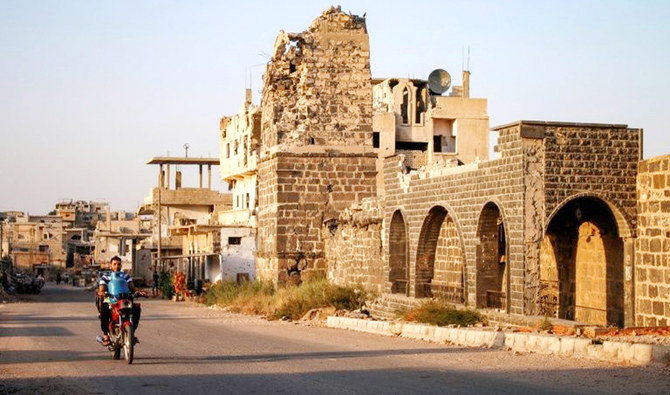BEIRUT: Bombings, gun violence and mysterious assassinations: In Syria’s southern province of Daraa, an experiment to use surrendering opposition fighters as regime proxies has seen the area descend into lawlessness.
Unlike other parts of Syria retaken by the regime, the army has not deployed across the whole province, relying instead on its unlikely partners to ensure security.
But the surrender deal “has failed to usher in stability, and chaos reigns,” according to Salam, a former Daraa resident who left the province last month.
“The assassinations and explosions are increasing day by day,” the man in his thirties added, asking to use a pseudonym for fear of reprisals.
Some fighters and their families started evacuating Daraa in July 2018 under a surrender deal brokered by regime ally Russia after weeks of fierce bombardment.
Their loss of the province dealt a symbolic blow to the uprising, which started with massive protests in Daraa in 2011 after a group of teenagers were arrested over anti-regime graffiti.
Under the 2018 deal, opposition fighters who chose to remain were granted amnesty on condition they hand over heavy weapons. Light firearms were exempt.
After a series of victories against fighters and militants, Bashar Assad’s regime now controls around 60 percent of the country.
Regime institutions have returned to Daraa. But unlike in other parts of Syria back under regime control, from which most opposition fighters withdrew, many former opposition fighters stayed behind in Daraa.
They retain control over large rural areas to its south, west and east, according to the Syrian Observatory for Human Rights.
They also hold southern parts of Daraa’s provincial capital, known as Daraa Al-Balad, the Britain-based monitor says.
Some have started working with state institutions or joined a Russian-backed contingent of the Syrian army.
Syrian military and security forces man checkpoints on the outskirts of these areas, the Observatory says.
Daraa province lies on the frontier with Jordan, which used to back opposition in the province before last year’s detente between Amman and Damascus.
It also borders Israel, which is suspected of working with Russia to prevent Iranian-backed forces from deploying near its frontier, according to analysts.
The region’s “uniqueness lies in the degree to which opposition structures have remained intact,” said Alex Simon of the Synaps network, a Beirut-based research group.
The regime’s “comparatively hands-off approach” to the province reflects an “effort to economise what remains of a depleted military apparatus,” he said.
Simon said former opposition factions “make convenient proxies for the Russians and the regime” in areas where the army is absent.
“But they’re also a liability: Residual weapons and simmering anti-Assad sentiment create the potential for violent flareups,” he added.
Loyalists in Daraa routinely face the menace of explosions and gunfire, says the Observatory, which has documented 60 such attacks since June.
Omar Al-Hariri, an opposition activist, said the proliferation of weapons in a province still bubbling with anti-Assad sentiment “will naturally result in the formation of sleeper cells.”
“This is why operations against the regime have started to intensify,” the Daraa-born activist told AFP.
But, Rifaat, another Daraa resident, said it was impossible to determine who is responsible.
“There are weapons in every house,” he told AFP, also using a pseudonym.
“Anyone can murder anyone for whatever reason.”
The UN says civilians working with state institutions, as well as former opposition fighters, have been hit by seemingly targeted killings.
In March, dozens took part in a rare protest after a statue of Assad’s late father, Hafez Assad, was erected to replace one destroyed by protesters at the start of the uprising.
And last month, anti-regime graffiti re-appeared on a Daraa wall.
Daraa is similar to other former opposition bastions in that hundreds there have been detained and forcibly conscripted into Assad’s army despite the so-called “reconciliation deals.”
Between July 26 last year and the end of March, at least 380 people were arrested or detained, the UN says.
“Many of those arrested were humanitarians, army defectors or people affiliated with anti-government forces,” said Sara Kayyali, Syria researcher at Human Rights Watch.
Such abuses have transformed reconciliation promises into “empty words,” she said.
To avoid arrest or conscription, Rifaat said he does not leave Daraa Al-Balad.
“There are many others just like me,” he told AFP.
“As long as we don’t cross regime checkpoints outside the area, nobody can reach us.”
Rifaat said he sometimes feels as if he is under siege.
But, he said, that is “a million times better than fighting with the regime or being imprisoned.”














